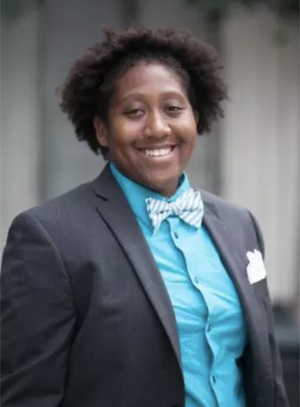Tamika Butler of the Los Angeles Neighbourhood Trust visited Halifax last week as one of the keynote speakers for the organized by students in the ║┌┴¤│ď╣¤═°School of Planning.
Inclusive urban planning means creating cities that are safe, accessible and equitable ÔÇö places that work for everyone.
For this to happen, experts say we need to acknowledge those who have historically been left out of the conversation.
 ÔÇťWe have to acknowledge that people experience things differently,ÔÇŁ said Tamika Butler (left), executive director of the Los Angeles Neighbourhood Trust. ÔÇťThere are people who have been historically neglected and planned against, and we have to start doing things that plan for them.ÔÇŁ
ÔÇťWe have to acknowledge that people experience things differently,ÔÇŁ said Tamika Butler (left), executive director of the Los Angeles Neighbourhood Trust. ÔÇťThere are people who have been historically neglected and planned against, and we have to start doing things that plan for them.ÔÇŁ
Butler delivered the annual Carmichael Lecture last Thursday evening at the SHIFT: Streets conference, a three-day gathering with panels and workshops organized by students in DalÔÇÖs School of Planning. An annual affair, this yearÔÇÖs SHIFT conference centred on the theme of making ÔÇťgreat streets together.ÔÇŁ
In order to do this, Butler explained that it is necessary to look to the past and see the way historical inequities in our laws and customs continue to impact the way our communities are planned.
ÔÇťYou will repeat history if you are afraid to have honest conversations,ÔÇŁ said Butler, whose organization addresses social and racial equity issues by building parks and gardens in park-poor communities across greater L.A.┬á┬á ┬á
Feeling safe in one's community
Butler described her experience as a black woman in America and the fears that she has every day.
ÔÇťEvery time I go to the park, I worry that people will call the cops on me,ÔÇŁ she told the audience gathered at the Halifax Marriott Harbourfront for her talk.
She also mentioned the story of Eric Garner, who lost his life in 2014 for standing on a sidewalk, because the police suspected him of selling cigarettes. If this were truly a shared street, Butler noted, this tragedy would not have happened.
People who do not have to worry about being unsafe in their own community have a certain level of privilege. Having this privilege means that one has to think outside their identity, and plan for those who have experienced oppression, she said.
While trying to improve communities, it is important to ask the hard questions, such as: are the changes making the area nicer for the people who are already there? Or are they simply trying to push those people out?
ÔÇťIf you want to plan for a community, you have to be able to acknowledge the reality that community faces,ÔÇŁ said Butler.
Working together
The community also has to be part of the planning itself. It is not simply about having diverse people at the table, but about giving them decision-making power. ÔÇťWe have to get past diversity, and to inclusion,ÔÇŁ said Butler.
In order to make streets more equitable, according to Butler, we must become allies for the historically disadvantaged. This requires taking risks, acknowledging past-wrongs, and working towards solutions.  
Butler believes it is important to ÔÇťco-powerÔÇŁ community members rather than ÔÇťempowerÔÇŁ them ÔÇô a distinction that lies in understanding the insights that locals bring to the conversation.
ÔÇťYou have to realize that when youÔÇÖre working in communities, the power is already there,ÔÇŁ said Butler. ÔÇťYou have to work with them.ÔÇŁ

